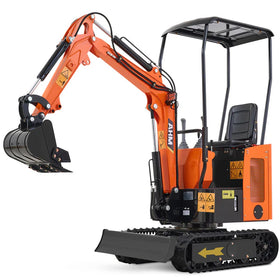The kind of gas for a lawnmower you choose directly impacts starting reliability, engine longevity, and overall performance. In fact, the difference between a smooth-running mower and one that gives you constant problems comes down to one simple choice most of the time: what gas for a lawn mower you put in the tank.
As any lawnmower owner would know, small engines are more sensitive to fuel quality than car engines as they operate at higher temperatures, have simpler fuel systems, and sit unused for longer periods.
Don’t sweat it, though - understanding what kind of gas lawn mower engines need isn't that complicated, but having that knowledge can save you hundreds of dollars in repairs and keep your lawn looking great all year long.
What is the Overall Best Gas for Lawn Mowers?
Many owners agree that the best gas for lawn mower use is regular unleaded gasoline with an 87 octane rating and no more than 10% ethanol (E10). This combination provides the right balance of performance, engine protection, and cost-effectiveness for most lawn mower engines you’d come across.
Here's why this type works best:
- 87 octane prevents engine knock while being the most economical choice
- E10 (10% ethanol) is the maximum safe ethanol content for small engines
- Regular unleaded is readily available at virtually every gas station
Other Kinds of Gas Best for Lawn Mowers
1. Ethanol-Free Gas (E0)
Ethanol-free gas is the best choice for equipment that sits unused for extended periods. This fuel contains zero ethanol and typically costs $0.30-0.50 more per gallon than E10.
Benefits of ethanol-free gas:
- Can sit for months without degrading
- No moisture absorption leads to corrosion
- Better fuel efficiency
- Less risk of fuel system damage
Go for ethanol-free gas. If you plan to store your mower for months during winter, use it infrequently, or want the maximum protection for your engine.
2. Premium Gasoline (89-93 Octane)
You typically don’t need premium gasoline with higher octane ratings for lawn mowers. However, there are some situations where it might become a good fit:
Benefits of premium gasoline:
- Best for operating at high altitudes of over 5,000 feet in elevation
- Suitable for high-performance or commercial engines with higher compression ratios
For most homeowners, though, premium gas for lawn mower use would be simply overkill, as it mostly achieves the same results as regular unleaded.
3. Pre-Mixed Canned Fuel
Pre-mixed canned fuels like TruFuel combine ethanol-free gasoline with fuel stabilizers. These cost $15-20 per gallon but offer the maximum convenience with the promise of protecting your engine.
Benefits of canned fuels:
- Ready to use with no mixing or additives needed
- Have a long shelf life of 2-5 years when unopened
- Premium fuel quality with consistent octane and no ethanol
- Contains built-in stabilizers that prevent fuel degradation
Pre-mixed fuel is the best choice for mowers that are used occasionally, those that go into seasonal storage, or when you want absolute peace of mind about fuel quality.

How to Know Which Gas is Best for Your Lawn Mower
1. Check The User Manual First
The user manual that comes with the lawn mower specifies the exact type of gas to use. When checking the manual, make sure to look for these key specifications:
- Minimum octane rating
- Maximum ethanol content
- Manufacturer-recommended fuel additives
- Special instructions for storage or seasonal use
2. Keep Your Usage Patterns In Mind
Standard E10 gasoline with an octane rating of 87 is ideal for regular weekly use, as frequent use will prevent the fuel from sitting for long enough to cause engine problems.
Ethanol-free gas or E10 with fuel stabilizer provides better reliability if you use the mower occasionally, when the mower has to sit unused for weeks or months.
Additionally, make sure to always use ethanol-free gas or add fuel stabilizer before storing your mower for winter.
3. Identify Your Engine Type
Most modern lawn mowers come with 4-stroke engines that require straight gasoline with no oil mixed in. These engines have separate oil reservoirs for lubrication.
The less common 2-stroke engines, on the other hand, require a gas-oil mixture to run, typically in a 50:1 ratio. But it’s always best to check your manual for the exact mixing requirements.
Explore The Latest Gas Lawn Mower Models in 2025!
1. LM-55 Remote Control Lawn Mower
The AHM LM-55 with its 21-inch cutting width is the perfect example of how modern lawn mowers are designed to maximize fuel efficiency.
This innovative mower combines a rechargeable 12V battery for quiet operation with a 5 HP 4-stroke engine that runs on standard 87 octane gasoline.
This mower’s ability to handle 45-degree slopes and operate in a range of up to 545 yards makes it perfect for challenging terrain where fuel efficiency matters most.
2. X80 and X120 Remote Control Mowers
If you are looking to mow larger properties, consider the X80 remote control lawn mower with its 31.5-inch cut and the X120 with a 47.2-inch cut. Both models run on 90+octane gasoline, E0 or E10, and come with a 13.6 HP hybrid systems that deliver impressive power and fuel economy.
X80 specifications:
- Can mow 1 acre per hour with impressive fuel efficiency
- 5 hours of operation per tank with the ability to cover up to 5 acres
- Dual 650W motors to supplement the gas engine
X120 specifications:
- Mows 1.5 acres per hour for maximum productivity
- Dual 850W motors provide electric assist for fuel savings
Both models come with a remote control range of 3280 feet and zero-turn capabilities, allowing you to maximize the cutting efficiency while keeping fuel consumption to a minimum.
The Bottom Line
Finding the answer to “what is the best gas for lawn mower use?” isn't just about finding the most expensive option - it's about matching fuel quality to your needs and usage. For most homeowners, regular 87 octane E10 gasoline provides the best balance of performance, availability, and cost.
Consider ethanol-free gas if you’re looking for long-term storage, but don't splurge out on premium fuel unless your manual specifically asks for it.
If you make sure to use fresh fuel, store your mower properly, and choose a reputable gas station to pick up your fuel, your lawn mower engine will reward you with reliability, smooth operation, and years of trouble-free service when you need it.







